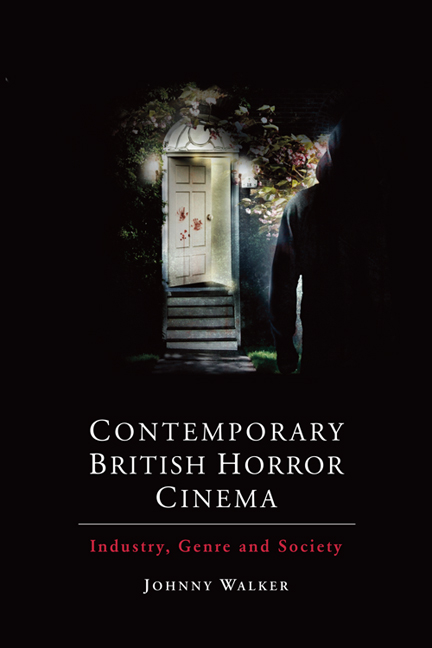7 - A kingdom of horror
Published online by Cambridge University Press: 05 August 2016
Summary
Contemporary British Horror Cinema: Industry, Genre and Society has documented how, from 2000 to 2014, British horror witnessed its biggest boom period since the 1970s. The book has shown how British horror films during this period were in constant dialogue with other nations, whether in terms of film economics or textual reflexivity, and also how they managed to retain specific cultural mores. It has been revealed that, while British horror was not as globally visible, as profitable or as written about, as other examples of popular British cinema – such as the romantic comedy or heritage film – it nevertheless remained one of the most persistent and consistent, varied and heterogeneous, innovative and widely distributed, genre of films.
This chapter, as a means of closure, will reflect briefly on the key issues that have been addressed over the last six chapters, before considering some of the directions that the study of British horror cinema could – or, indeed, should – take in the future. It is hoped that this chapter will provide a springboard for further scholarship that will be as dynamic as the films themselves.
The book began by identifying some of the problematic ways that British horror has been discussed in the past: namely, under the auspices of David Pirie's (1973, 2008) influential ‘heritage of horror’ argument. With this in mind, Chapter 2 sought to examine the industrial – rather than the cultural – reasons from British horror's revival in the 2000s, examining how the films were funded, marketed and distributed. It was argued that horror was initially conceived as a widely marketable genre that could aid in the successful ‘relaunch’ of a British film industry following the instating of the UKFC in 2000, and the subsequent buzz (and controversy) that surrounded it. Citing industry data and reports, film reviews and industry testimonies, it was maintained, that, while in the past it has ‘more or less [been] impossible to think of British cinema without reference to its relationship with Hollywood’ (Street 2009: 240), Hollywood and American finance was, on the whole, absent from the production of British horror films in the first years of the twenty-first century.
- Type
- Chapter
- Information
- Contemporary British Horror CinemaIndustry, Genre and Society, pp. 131 - 140Publisher: Edinburgh University PressPrint publication year: 2015



